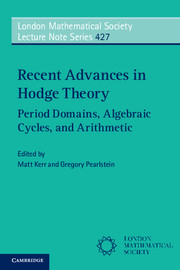Book contents
- Frontmatter
- Contents
- Preface
- Introduction
- List of Conference Participants
- Frontispiece
- PART I HODGE THEORY AT THE BOUNDARY
- PART II ALGEBRAIC CYCLES AND NORMAL FUNCTIONS
- PART III THE ARITHMETIC OF PERIODS
- (III.A) MOTIVES, GALOIS REPRESENTATIONS, AND AUTOMORPHIC FORMS
- 13 An introduction to the Langlands correspondence
- 14 Generalized Kuga-Satake theory and rigid local systems I: the middle convolution
- 15 On the fundamental periods of a motive
- (III.B) MODULAR FORMS AND ITERATED INTEGRALS
15 - On the fundamental periods of a motive
from (III.A) MOTIVES, GALOIS REPRESENTATIONS, AND AUTOMORPHIC FORMS
Published online by Cambridge University Press: 05 February 2016
- Frontmatter
- Contents
- Preface
- Introduction
- List of Conference Participants
- Frontispiece
- PART I HODGE THEORY AT THE BOUNDARY
- PART II ALGEBRAIC CYCLES AND NORMAL FUNCTIONS
- PART III THE ARITHMETIC OF PERIODS
- (III.A) MOTIVES, GALOIS REPRESENTATIONS, AND AUTOMORPHIC FORMS
- 13 An introduction to the Langlands correspondence
- 14 Generalized Kuga-Satake theory and rigid local systems I: the middle convolution
- 15 On the fundamental periods of a motive
- (III.B) MODULAR FORMS AND ITERATED INTEGRALS
Summary
ABSTRACT. For a motive over Q, the author introduced the fundamental periods which contain Deligne's periods as a special case. We will generalize the fundamental periods to a motive over an algebraic number field. We will discuss a few applications.
Introduction
Let M be a motive over Q with coefficients in an algebraic number field. A well-known conjecture of Deligne ([D]) describes the critical values of the L-function L(M, s) of M in terms of the periods c±(M). We are interested in investigating the change of Deligne's periods c±(M) under various algebraic operations, for example the tensor product of two motives. For this purpose, the author introduced the fundamental periods of a motive M ([Y2]) and showed that the concept can be applied efficiently to study the periods of Siegel modular forms.
The purpose of this paper is twofold. First we will give a few more illustrative applications. These are: (i) To express Harris’ quadratic periods ([HA]) by the fundamental periods. (ii) A simple derivation of a formula of Blasius ([B1]) for periods of a tensor product of rank 2 motives. (iii) On periods of a Siegel modular form. Second we will generalize the concept of the fundamental periods to motives over a number field F. This is necessary, for example, to describe the change of periods for the tensor product of motives over F.
Now we will explain the organization of this paper. In section 1, we will review the fundamental periods briefly. In section 2, we will give applications to Blasius’ formula and to quadratic periods. In section 3, we will give an application of the fundamental periods to Siegel modular forms. In section 4, we will generalize the fundamental periods to a motive over a number field.
The topic of this paper is different from the author's talk in Vancouver. I wrote down the contents of my talk at the conference on “p-adic modular forms and arithmetic” in UCLA, June 2012, which was not published before.
Notation. An algebraic number field means an algebraic extension of Q of finite degree contained in C. For an algebraic number field E, JE denotes the finite set of all isomorphisms of E into C. For a commutative ring A, M(m, n, A) denotes the set of all m×n-matrices with entries in A.
- Type
- Chapter
- Information
- Recent Advances in Hodge TheoryPeriod Domains, Algebraic Cycles, and Arithmetic, pp. 393 - 412Publisher: Cambridge University PressPrint publication year: 2016
- 1
- Cited by



